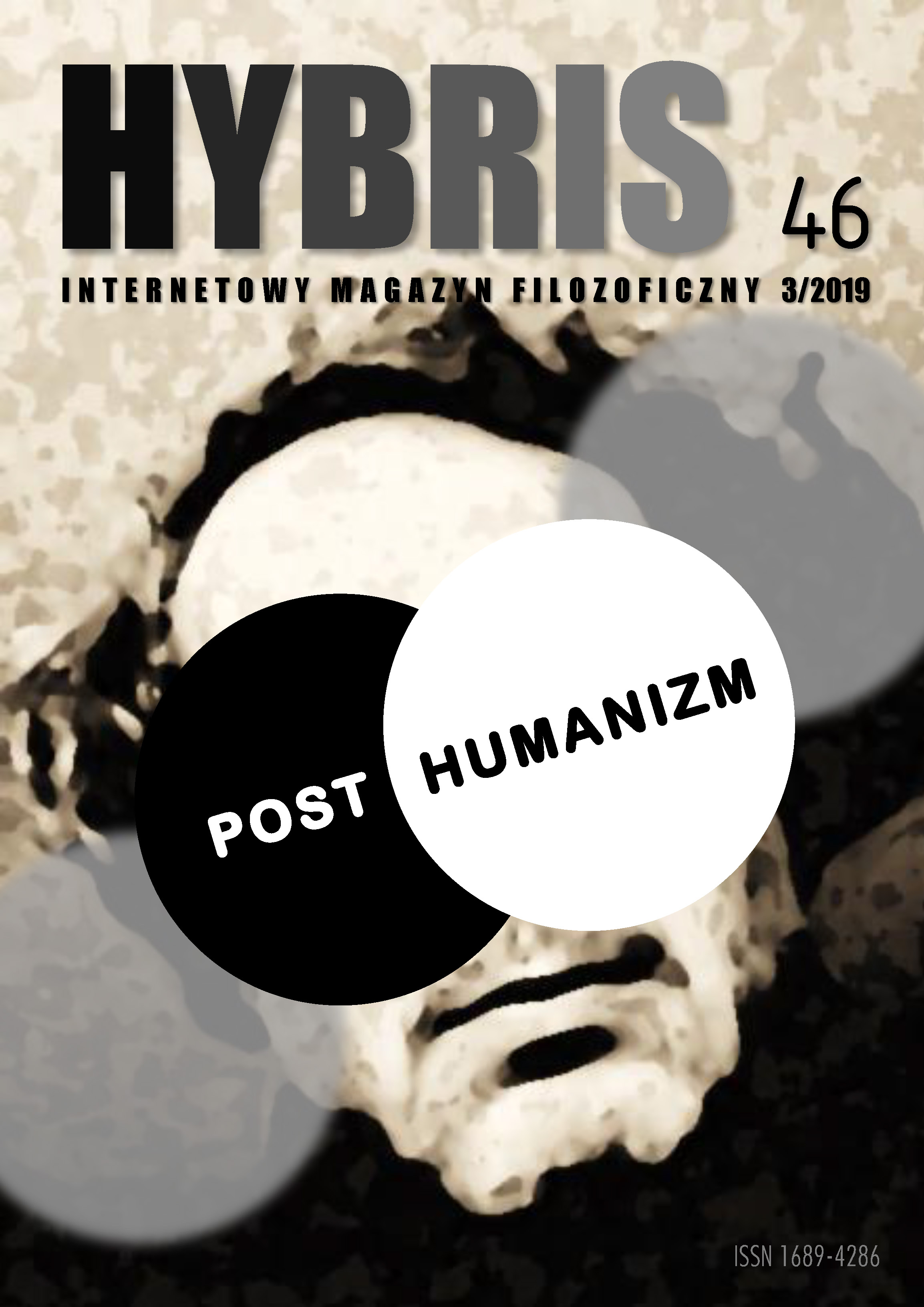The singularity of Raymond Kurzweil as a vision of history
DOI:
https://doi.org/10.18778/1689-4286.46.04Keywords:
singularity, Kurzweil, history, historiosophy, transhumanismAbstract
In my article I present the characterization of the state of "singularity" as an upcoming moment in history, which is being foretold by Raymond Kurzweil – futurologist, computer scientist and transhumanist. I also present the concept of dividing history into six epochs proposed by Kurzweil, who captures the history of the whole universe as a process of increasing the amount of information. In describing Kurzweil's thought, I do it from the philosophical point of view, showing its historiosophical moments.
References
Bostrom N. (2003), The Transhuamnist FAQ. Version 2.1, World Transhumanist Association, Oxford.
View in Google Scholar
Bostrom N. (2005), Transhumanist Values, [w:] Ethical Issues for the Twenty-first Century, Frederick Adams, Philosophy Documentation Center, s. 3–14.
View in Google Scholar
DOI: https://doi.org/10.5840/jpr_2005_26
Comte A. (2009) Rozprawa o duchu filozofii pozytywnej, tłum. J. K, Hachette, Warszawa.
View in Google Scholar
Condorcet J.A.N. de C. (1957), Szkic obrazu postępu ducha ludzkiego poprzez dzieje, tłum. E. Hartleb, Państwowe Wydawnictwo Naukowe, Warszawa.
View in Google Scholar
Dusek V. (2011) Wprowadzenie do filozofii techniki, tłum. Z. Kasprzyk, WAM, Kraków.
View in Google Scholar
Eden A.H. i Moor J.H. (2012), Singularity Hypotheses A Scientific and Philosophical Assessment, Springer Publishing, New York.
View in Google Scholar
DOI: https://doi.org/10.1007/978-3-642-32560-1
Eden A.H. i Steinhart E. (2012), Singularity Hypotheses: An Overview: Introduction to: Singularity Hypotheses: A Scientific and Philosophical Assessment, [w:] Singularity Hypotheses: A Scientific and Philosophical Assessment, red. A.H. Eden i J.H. Moor, Springer Publishing, New York, s. 1–12.
View in Google Scholar
DOI: https://doi.org/10.1007/978-3-642-32560-1_1
Flint R. (1874), The philosophy of history in Europe. 1, The philosophy of history in France and Germany, William Blackwood and Sons, Edinburgh.
View in Google Scholar
Fukuyama F. (2004), Koniec człowieka: konsekwencje rewolucji biotechnologicznej, tłum. B. Pietrzyk, Wydawnictwo Znak, Warszawa 2004.
View in Google Scholar
Fukuyama F. (2004), The World’s Most Dangerous Ideas - Transhumanism, „Foreign policy.”, nr 144, s. 42.
View in Google Scholar
DOI: https://doi.org/10.2307/4152980
Garbowski M. (2012), Transhumanizm – projekt naturalistycznego Boga, [w:] Avant-plus, red. B. Brzostek i T. Górny, Ośrodek Badań Filozoficznych, Toruń, s. 181–189.
View in Google Scholar
J. Hughes (2003), Rediscovering Utopia, https://web.archive.org/web/20070927204653/ http://archives.betterhumans.com/Columns/Column/tabid/79/Column/232/Default.aspx [dostęp: 29.09.2017]
View in Google Scholar
Kopciuch L. (2014), Szkice systematyczne z filozofii dziejów, Wydawnictwo Uniwersytetu Marii Curie-Skłodowskiej, Lublin.
View in Google Scholar
Kuderowicz Z. (1983), Filozofia dziejów, Wiedza Powszechna, Warszawa.
View in Google Scholar
Kurzweil R. (1999), The age of spiritual machines: how we will live, work and think in the new age of intelligent machines., MIT Press, London.
View in Google Scholar
Kurzweil R. (2013), Nadchodzi osobliwość: kiedy człowiek przekroczy granice biologii, tłum. A. Nowosielska i E. Chodkowska, Kurhaus Publishing, Warszawa 2013.
View in Google Scholar
Łach T. (2012), Strach przed postępem – kilka uwag o nurtach antytechnicznych, „Kultura i Wartości”, nr 4, s. 33–43.
View in Google Scholar
Moravec H. (1988), Mind children: the future of robot and human intelligence, Harvard University Press, Cambridge.
View in Google Scholar
More M. (2003), The Principles of Extropy, Extropy Institute, http://www.aleph.se/Trans/Cultural/Philosophy/princip.html [dostęp: 27.09.2017].
View in Google Scholar
Mumford L. (2012), Mit maszyny. T. 1, tłum. M. Szczubiałka, Wydawnictwo Naukowe PWN, Warszawa.
View in Google Scholar
Mumford L. (2014), Mit maszyny. T. 2., tłum. M. Szczubiałka, Wydawnictwo Naukowe PWN, Warszawa.
View in Google Scholar
Segal H.P. (2005) Technological utopianism in American culture, Syracuse University Press, New York..
View in Google Scholar
Szymański K. (2015), Transhumanizm, „Kultura i Wartości”, 2015, nr 13, s. 133–152.
View in Google Scholar
DOI: https://doi.org/10.17951/kw.2015.13.133
Szymański K. (2016), Katastrofizm O. Spenglera i G. Pichta w kontekście filozofii techniki, „Transformacje”, 2016, nr 1–2, s. 122–141.
View in Google Scholar
Szymański K. (2016),Transhumanizm w kontekście stanowisk historiozoficznych, [w:] Technokultura: transhumanizm i sztuka cyfrowa, red. D. Gałuszka, G. Ptaszek, i D. Żuchowska- Skiba, Wydawnictwo Libron, Kraków 2016, s. 25–45.
View in Google Scholar
Vinge V. (1993), The Coming Technological Singularity: How to Survive in the Post-Human Era, „Vision-21”, s. 11–22.
View in Google Scholar
Postman N., Technopol: triumf techniki nad kulturą, tłum. A. Tanalska-Dulęba, Warszawskie Wydaw. Literackie Muza, Warszawa 2004.
View in Google Scholar
Downloads
Published
How to Cite
Issue
Section
License

This work is licensed under a Creative Commons Attribution-NonCommercial-NoDerivatives 4.0 International License.






